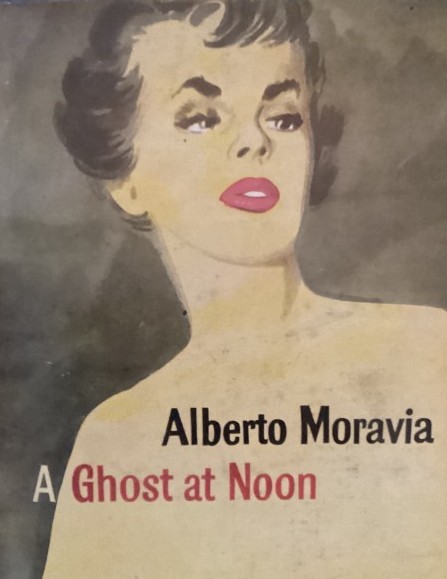Inspiring Older Readers
 posted on 22 Mar 2023
posted on 22 Mar 2023
A Ghost at Noon by Alberto Moravia
Published in its English translation in 1955, A Ghost at Noon was given the title, The Despised Husband in the USA and it’s easy to see why this ploddingly literal title was adopted by American publishers. The story concerns a young poet and writer, Riccardo Molteni, who aspires to break into the lucrative film script market in order to maintain a lifestyle he imagines appropriate to his newly married status. The Forties had seen Italian new wave cinema get a reputation for being on the cutting edge of the European movie world and Molteni is desperate to give his wife, Emilia a taste of a world she couldn’t imagine given her working class background.
Early in their marriage the young couple seem to be perfectly happy and compatible until Riccardo agrees to write a script for the film producer, Battista. Lured by the chance to get more work – and an especially juicy commission to do a version of the Odyssey, Battista’s vanity project. Keen to keep the producer onside, Molteni tries too hard to please him and seems unwittingly to push Emilia into compromising proximity with this man who clearly has designs on his wife.
Soon the relationship between Riccardo and Emilia begins to change and it becomes clear to the writer that something has gone badly wrong between the two of them. Emilia withdraws from her husband but keeps refusing to say why, while Riccardo becomes obsessed with discovering the reason his marriage seems to be falling apart. He is still deeply in love and physically attracted to her but finally, under the stress of his constant demands to know what’s wrong with her, she confesses that not only does she not love him any more but she despises him.
While his marriage is in turmoil the issue of Battista’s pet project rumbles on with the introduction of a German film director, Rheingold, who is brought in to work with Riccardo on the script. It becomes clear that Battista wants a big sword-and-sandal style epic while he and Rheingold want something more psychologically sophisticated. When Rheingold outlines his vision for the script, Molteni is spooked to discover that the German’s view of the relationship between Ulysses and Penelope is virtually a carbon copy of what has happened between Riccardo and Emilia.
Eventually Emilia leaves Molteni, seemingly to succumb to the advances of Battista but there is tragedy just around the corner and Molteni will be forced to confront his demons and ghosts.
The good folk at Kirkus who reviewed the book on its US release, described the book as “a hovering, lowering, and somewhat neurasthenic scrutiny of an intimate relationship” and that strikes me as a perfectly fair overview. I’ve also seen the book described as an existential drama set against the backdrop of the overblown Italian film industry and that too has resonance. Ultimately, however, this is a novel about obsession and rejection – about being shut out of the place that offers the ultimate understanding of one’s self.
I’m not at all sure that the book is still in print but there are hard and paperback copies that can be found on the second hand market – but their comparative rarity means you might have to pay a little more than you might otherwise expect.
Terry Potter
March 2023